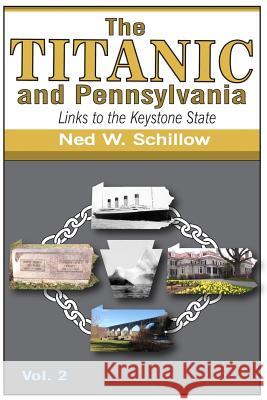The Titanic and Pennsylvania: Links to the Keystone State, Volume 2 » książka
The Titanic and Pennsylvania: Links to the Keystone State, Volume 2
ISBN-13: 9781518797132 / Angielski / Miękka / 2015 / 478 str.
The Titanic and Pennsylvania: Links to the Keystone State, Volume 2
ISBN-13: 9781518797132 / Angielski / Miękka / 2015 / 478 str.
(netto: 73,33 VAT: 5%)
Najniższa cena z 30 dni: 72,69 zł
ok. 13-18 dni roboczych.
Darmowa dostawa!
It was the evening of April 14, 1912, and the lights of the Titanic reflected brightly off of the cold waters of the North Atlantic. Inside the passengers were lingering over dinner, strolling in the crisp night air, or singing around the piano. Among them were many persons who were linked to Pennsylvania in ways other than heading home. Some were previous residents who had since moved away; some were destined to settle in the state sometime after 1912. Others were descendants of Pennsylvania families who dated back to the earliest colonial days or who had relatives living there in more recent years. A few had work connections to the Keystone State including actors and producers, artists and architects, fashion designers and businessmen. This volume tells the story of these 74 persons as well as one unborn child, all with links to Pennsylvania. Also included are glimpses at nautical experts, politicians, lawyers, writers, and movie and theatrical producers, all tied to the Keystone State, whose lives were touched by the Titanic in the century after the sinking. The Titanic and Pennsylvania: Links to the Keystone State, volume 2, takes a close look at those passengers aboard the Titanic who were not actually Pennsylvanians in 1912 when the ship sailed, but who nevertheless had distinct ties to the state at some point in their lives. Short biographies are provided for these persons and families, providing insights into their personal histories and, where possible, to their lives in the years that followed the tragedy. Chapter 9 focuses on former residents of Pennsylvania and chapter 10 looks at those survivors who would move to the Keystone state in later years. Chapter 11 examines a number of individuals whose work connected them to Pennsylvania in some way. Included among them are persons who acted, staged Broadway productions, painted, created world-class fashion, sold merchandise in the finest department stores, designed railroad stations, or purchased railway engines and equipment. A handful of passengers are sometimes listed as heading to Pennsylvania, but their actual destinations may have been elsewhere, and these individuals are presented in chapter 12. Family ties included parents, grandparents, wives or ex-wives, and other more distant relatives provide the links for those discussed in chapter 13. Finally, chapter 14 presents two tangential links, including an individual whose professional goals crystallized at the 1876 Philadelphia Centennial Exhibition and a family very much in the prayers of a church in York, Pennsylvania. Somewhat surprisingly, other persons were tied to the Titanic and Pennsylvania even though they never boarded the ship. Chapters 15 and 16 look at these persons. Included among them are major business leaders as well as some lesser personalities who had intended to travel aboard the ship but canceled their reservations before the maiden voyage. Also numbered here are Pennsylvanians who were aboard the Carpathia when survivors were taken aboard as well as other individuals who were involved in the testimony, legal wrangling, or investigations related to the disaster. Finally, a century of books, movies, and stage productions about the Titanic have brought the story of the ship to countless millions, and many links between those presentations and Pennsylvania are also presented here. Appendices are included citing sources and listing Pennsylvania-linked passengers and non-passengers who are tied to the Titanic story. This book is the second of a two volume series, with the first volume looking at those passengers aboard the Titanic who were living in Pennsylvania at the time they sailed aboard the ship or who were immigrating to the state or who had been born there but had moved away sometime before 1912.











